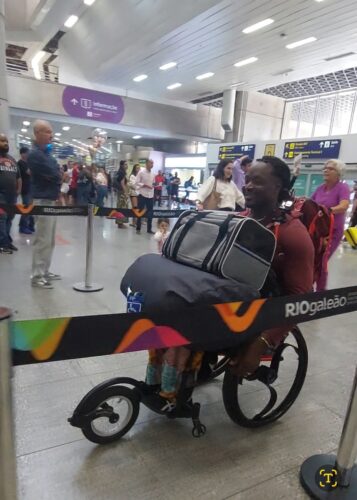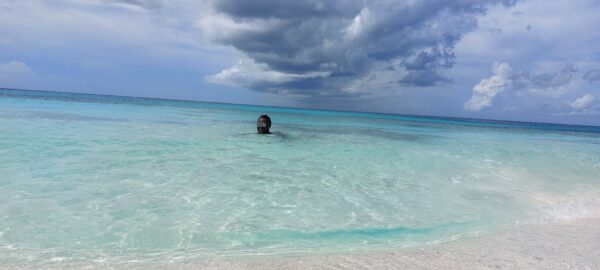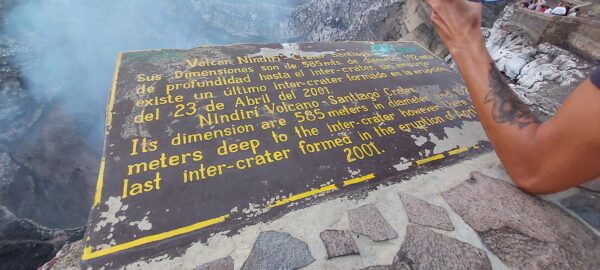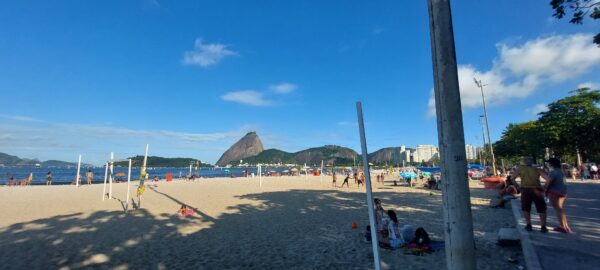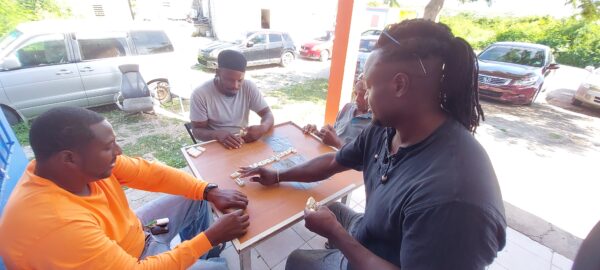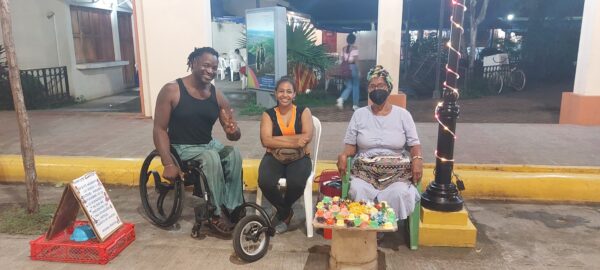
This month as summer soars, our thoughts turn to holidays and travel.
Who best to help us but one of our amazing customers, Kingsley Ijomah. Kingsley is a coder by profession, and is fortunate to be able to work from pretty much wherever the wifi supports him. He is on an extended travel adventure with his partner Dee. He’s spent a lot of time in Portugal, Central and South America in the past year or so, but he popped back to the UK for a couple of weeks recently to see family and home – and to get a new pair of push rims from us 🙂
I caught up with Kingsley when he came in to Loopwheels HQ to choose new push rims. He’s visited places where people aren’t familiar with visitors using a wheelchair. I asked him about what he’s learned on his travels and if he had any tips for other people who use a wheelchair and are contemplating major travel.
Here’s a taste of our conversation, which began with the mundanely practical and ended with the deep and philosophical:
Kingsley’s top tips for adventurous travel
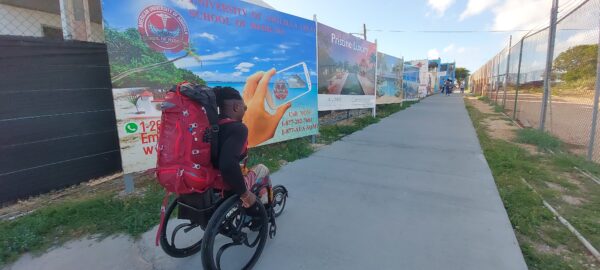
Accessibility: “THE TRIPLE ASK”: Ask and ask and ask again!
So many times on my travels, I ask “is your Airbnb accessible?” and they say yes – but it may not be. They may just be thinking, “yes the room is on the ground floor”. Before you even get into the questions about inside the room, you need to make sure the room actually is accessible. Even it’s on the ground floor, it may not be accessible if there’s a massive step or a couple of steps from the outside pavement into the downstairs room – so just don’t assume anything!
I get the owner to put themselves into my position and walk through it all with me whilst I’m on the phone. So I say: “Please can you just go outside onto the pavement in front of the building and tell me what you can see”. Mentally walk them through the process. “How do I get from outside? Is there a step? If so is it one step (How big?) or more than one? Please count them and tell me!”
I found it’s best to phone ahead and then confirm by email as well. The phone call helps them understand why you’re asking these questions and the email gives written evidence if there’s an issue later.
Learn the word for LOO in the local language!
l find out what the word for WC is in every language. You’re going to need to ask about bathroom accessibility, not just where you sleep . . . so look it up before you make that phone call!
Okay accommodation sorted . . . Now you’re ready to go off to explore , , ,
TRANSPORT . . . Think Plan A and Plan B!
Think about how you are going to go about exploring (train, bus, taxi, Uber) and what complications there could be.
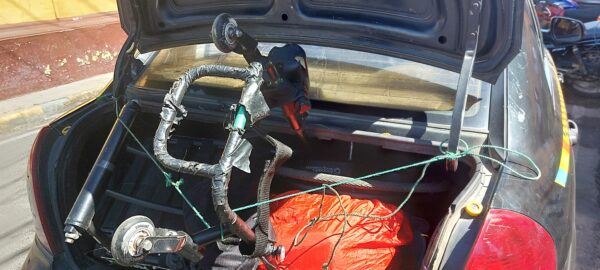
Wheelchair in the boot? Not ideal!
When I was in Granada, I booked a van to take us back to the airport. The day we’d booked, the company saw the bookings were for just two people: myself and my partner. The company decided therefore they didn’t need a shuttle bus, and they could replace it with a tiny car. On the day it turned out there was also one other passenger after all. With my wheelchair, the two of us and another passenger, and all our luggage, it just wasn’t going to work.
Uber can be a problem because they don’t tell you the type of car that’s going to turn up, or what it might already be carrying. I found in Latin America and Central America that it’s quite common for cars to carry a big cylinder of local gas in the boot as fuel. That means no space for a wheelchair.
My top tip for taxi transportation with a wheelchair is to use the front passenger seat for transporting a wheelchair, and don’t even bother with checking out the boot. It turns out you can manage to get a wheelchair through the tiniest front car door and onto the passenger seat, so that’s now my first option.
Ask for help – but do it in advance if you can!
We might take it for granted that an Uber or taxi driver would help! That’s not going to happen in some places. So when you order an Uber or indeed any taxi, always say “I might need assistance” at the time of ordering, so you can set an expectation.
Bus drivers can be the same. As an example, a bus driver wouldn’t help me in Sweden. Some buses have an accessibility ramp that comes out. In Stockholm, you have to pull it out manually and that wasn’t easy from the pavement when the lever is above you. I thought the bus driver might give me a hand with it, but he had other ideas – you just have to try to be prepared for every eventuality, and improvise when you can’t be.
If you need the loo – go posh!
My top tip on this very important subject is when you’re out and about and need to go, find the nearest really posh hotel or restaurant. They will have wider toilets and better accessibility. They will always let you in, in my experience, and want to provide good service. You don’t need to pretend you’re a guest or buy a drink. On this occasion, lean into your disability!
Be more daring! Don’t put limits on yourself.
Something I’ve learnt on my travels, is that it’s too easy to rule lots of things out in advance as impossible. I have had to learn to do away with my own limiting mind. I have decided I want to put myself in a position where I may be turned away. But I don’t want to turn myself away beforehand.
So even if I’m going to visit somewhere which I might tell myself is probably not really accessible to me, if I turn up, at the very least, I am making a statement.
And sometimes when I turn up, even to somewhere that I think probably will be challenging, I find it’s not as difficult as I thought it might be.
Or when I get there, I find a solution I never would’ve worked out in advance.
One time in Lisbon we were near the beach, it was really hot and I wanted to go for a swim. The distance from the front to the water’s edge was much too far for me, and it was a hot day. My crutches were sinking into the soft sand. There was no way my wheelchair could do it, and I could easily have just given up. But I spoke to the lifeguard and by asking him the question of how can I get to the water, I made it his problem, rather than my problem. He directed me to further down the beach, where there was a ramp that goes out right into the sea with a special chair with big inflatable wheels specially designed for the job. I didn’t know it was there, but he did. I could easily have gone home that day – but asking for help provided a perfect solution I didn’t know about.
Be open to the unexpected. Embrace the friction in your comfort zone!
It is interesting to reflect on what you gain from travel. I expected travel to open my eyes to other cultures. What I didn’t expect was that travel opens your eyes to your own culture and to myself. It gave me a realisation that I can choose to stay the same, or I can choose to be different after my travelling experience.
The contrast when I came home to the UK between how people in London behave compared with in South America was massive! It struck me travelling on the train straight after I got back, how easy it would be for me to go back into my shell and to go back into my own thoughts in overdrive, just like everyone else in the train carriage.
Travel can make you realise that, although you may feel you have to be the person you have become, this isn’t necessarily truly in your nature, and perhaps you can make a different choice. It creates a friction in your comfort zone. You pick up different cultural things. It’s a once-in-a-lifetime thing, your confidence changes you.
For example, we take a lot for granted here in the UK, and our biggest dream might be, I don’t know – to win the lottery! I realised that for many people in some of the countries I’ve been travelling in, what they desperately want in their wildest dreams is what I currently have already. This has made me feel more content with what I have.
In particular, spending time in Rio has helped me readjust my mentality. There the culture has much less focus on people keeping on working harder and wanting more material goods. I found an amazing mentality of simply “we’re fine and happy as we are”. People meet up early straight after work on the beach to play volleyball and then they later go home to their family to eat together. They really love their beach life, and that doesn’t cost them money. They’re not striving to work harder to pay for luxury – because free time with friends or family is in itself the best luxury.
That leads me onto my final tip . . .
Try to break into the community wherever you are.
Ask someone who works in the restaurant or at your accommodation questions like: what do you do after work? Where do you go out? Where do you like to eat, or have a drink? Get into the local community and don’t just visit the touristy stuff.
The fastest way to learn about a place is to get to know the people who live there. Get into people’s hearts and they will show you round the country in their own unique way.




